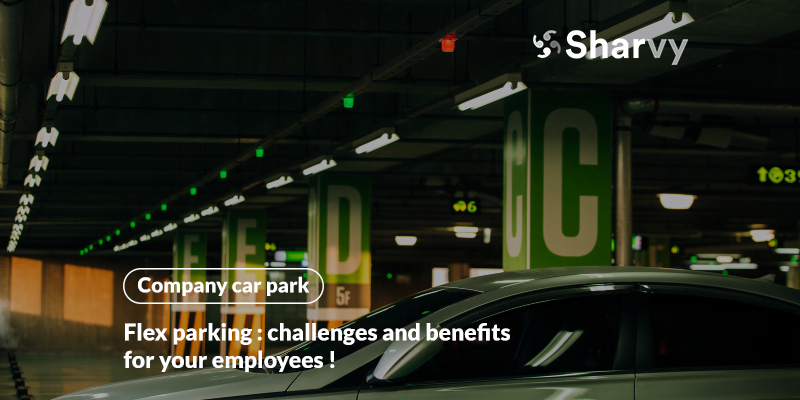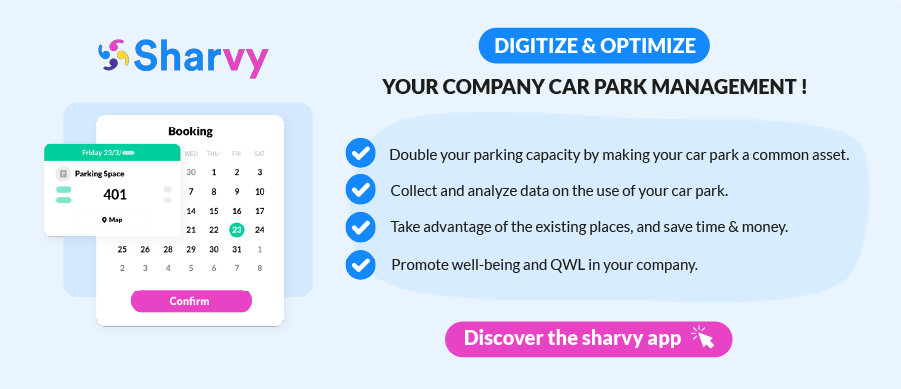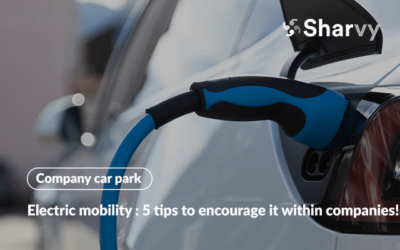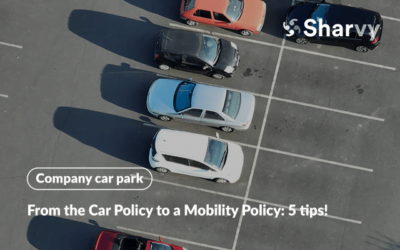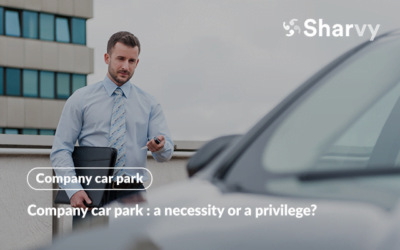Firstly, let’s look at what flex parking is. Flex parking is the sharing of parking spaces between employees. In other words, it means increasing the number of parking spaces at zero marginal cost. This way, parking in the company car park becomes collaborative and open to all!
It is no longer just reserved for a few people in the hierarchy. There are some issues and advantages to flex parking.
1. What are the challenges of flex parking for the company?
The first thing to remember is that company car parks are rarely complete. Because of teleworking, holidays, and business trips, many employees with a designated parking spaces are away from the office daily. As a result, their space remains vacant when others could be using it.
Flex parking is a popular solution to the frustrations of employees who need their own parking space.
Why is this? Reasonably, flex parking requires car park holders to communicate regularly about the availability of their parking space in the coming days and weeks. At the same time, employees use a dedicated application, such as Sharvy, to book a parking space.
In this way, more employees could have access to the company car park and will be relieved of the daily stress that the search for a space can cause. Moreover, companies are gradually becoming aware of the financial windfall beneath their feet and, therefore, of the importance of improving the management of their car park(s). Flex parking is so appealing because it considerably improves car park occupancy rates!
At the same time, flex parking allows companies to project a more modern and dynamic image to their employees, improving their experience. It breaks the mold by opening access to everyone, not just managers.
Finally, in addition to these advantages, a rented parking space costs a company between €1,500 and €2,000 a year. So, having areas that are not used every day represents a significant cost for the company. So switching to flex parking can save up to 30% of space and even reduce the number of areas. At the same time, it can also decide to rent out some of its places to make its car park more profitable!
How has the Atlantic Group saved 25% on its parking budget each year since implementing Sharvy? Download the case study and discover their strategy.
2. What are the advantages for the employees?
Every week, employees waste an average of half an hour looking for a parking space if they need access to the company car park. Daily, this is a source of stress that employers need to consider.
And the reason? It’s obvious : every morning, getting a parking space is a mad dash. Employees hurry to arrive before 9am. Otherwise, the car park is complete (if they’re lucky enough to have one!). For companies, it’s an actual black box. Nobody wants to manage it. We need to find out how it’s used or its future needs. It’s the one place in the company that has not been modernized since it was built.
So there’s no doubt about it : this has to be put right. All the more so since 22% of employees rank company car parks in the TOP 3 most important ways of improving their quality of life.
Thanks to flex parking and a dedicated solution to manage it like Sharvy, you can double the number of people who have access to your company car park and enable your employees to get to their place of work without being dependent on parking restrictions. Some companies even manage to give access to all their employees.
At the same time, you can save them a considerable amount of time each morning looking for a parking space. Nearly 20% of Europeans spend between 6 and 15 minutes each morning looking for a parking space at their place of work (Statista Research Department). Booking a parking space in advance therefore saves an hour every week! That’s a significant saving, both for the employee and the employer.
As a result, you’re having a (tangible) impact on your employees’ Quality of Life and Working Conditions (QWL).
No more recurring parking problems! Employees who used to see the car park half-full without being able to park there will be more satisfied. From now on, they will have access to it and see it much more.
Optimizing your company car park can also encourage your employees to adopt a more sustainable mode of transport. In fact, by giving all or some of your employees access to the car park via a well-thought-out and fair parking policy, you encourage rotation in parking spaces. As a result, car park holders are less reluctant to use public transport and/or favor soft mobility. And without losing the use of their parking space, which encourages multimodality. By optimizing your company car park, you can also improve your CSR policy.
To help employers in this process, downloading a checklist for optimizing your company car park may be a good idea. It’s a great way to take stock of safety, layout, and parking!
3. How do you set up a flex parking system?
Setting up a flex parking system starts with choosing a suitable digital solution, such as Sharvy.
One of its major assets is its fair algorithm, designed to share parking spaces fairly between employees. This algorithm takes into account the specific needs of each individual (such as days present and working hours) and allocates spaces optimally, avoiding the frustrations associated with fixed spaces that are often underused.
Employees can easily reserve a space in real-time via the application, while usage statistics enable the company to optimize its organization further.
Once the tool has been set up, it is crucial to make teams aware of its benefits, such as greater flexibility and fairness, and to offer them rapid training to ensure they get to grips with it smoothly. Finally, monitoring the results, combined with regular employee feedback, means that the rules can be adjusted to ensure that the system is perfectly adapted to everyone’s real needs!
To help employers with this process, it may be a good idea to download a checklist for optimizing company car parks. It’s a great way to assess safety, layout, and parking!
In conclusion
Flex parking is an innovative solution that optimizes the use of parking spaces within companies while meeting the diverse needs of users. By adopting this approach, companies allow a greater number of employees to park without frustration, whether they are drivers, electric vehicle owners, or two-wheelers. By integrating appropriate management tools, flex parking enhances the management of spaces while addressing the challenges of sustainable mobility and optimizing the use of parking facilities. This initiative contributes to improving the Quality of Life and Working Conditions of employees while offering significant financial benefits for the company.
Want to learn more? Check out our latest articles!
Electric mobility : 5 tips to encourage it within companies!
Find out how to promote electric mobility in the workplace? What solutions are available? Find the answers here.
From the traditional Car Policy to a Mobility Policy : 5 tips!
What are the differences between a Car Policy and a Mobility Policy? Which parking policies should you choose? Find the answers here.
Company car park : a necessity or a privilege?
Are companies obliged to offer their employees a company car park ? Is it a necessity, or rather a privilege ? The answers in this article.
Subscribe to our newsletter!
Resources
Contact us
+44 117 463 6990

